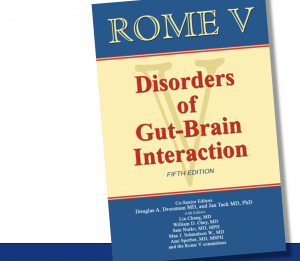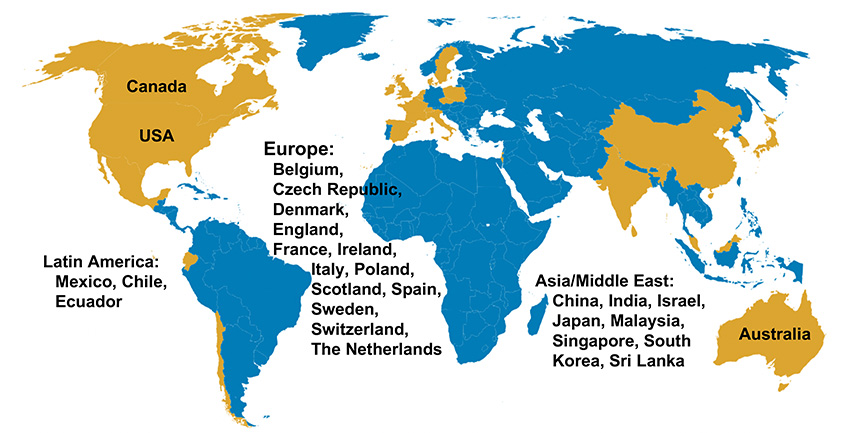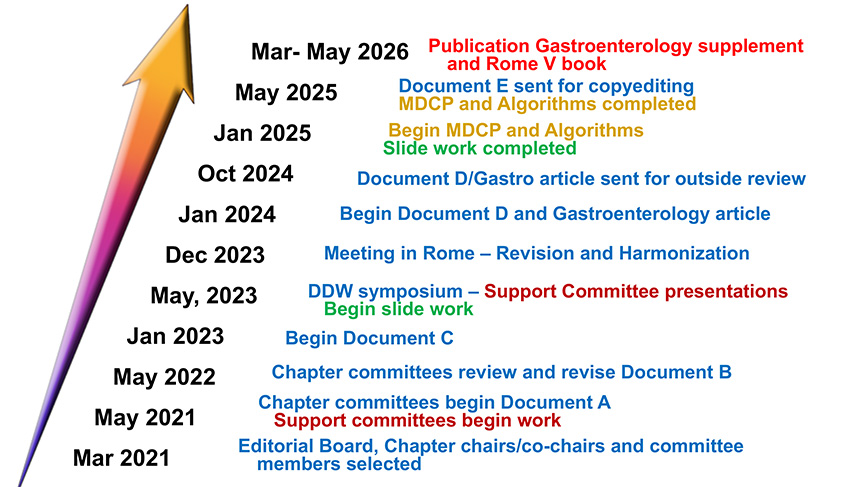About Rome V

One of the major functions of the Rome Foundation is to update and revise medical information on the DGBI and the Rome Criteria. This has been accomplished beginning with Rome I (1994), Rome II (2000), Rome III (2006) and Rome IV (2016). We are now beginning Rome V, which will be completed in 2026. The process relies on obtaining recent scientific evidence and using consensus (Dephi approach) to create a variety of educational documents. These documents evolve over a five-year period and are peer reviewed. The Rome V textbooks will be published in reduced form in Gastroenterology as a 13th edition.
The Rome V products will include: Rome V textbook (Vol I & II), a pediatric version, a primary care version and questionnaires and tables book. This information is extracted to create the diagnostic (Rome V Algorithms) and treatment (Rome V MDCP) books. In addition, all of these products are available in digital formats (E-books and Rome V online- containing all books). The Rome Foundation GI Genius Interactive Software program will also be updated to accommodate changes from Rome V.
For further information, see below.
144 Experts Representing 27 Countries

Editorial Board – Rome V:
Co – Senior Editors

Douglas A. Drossman, MD, RFF | President Emeritus and CEO
Professor Emeritus of Medicine and Psychiatry
UNC Center for Functional GI and Motility Disorders
University of North Carolina
Center for Education and Practice of Biopsychosocial Patient Care and
Drossman Gastroenterology
Chapel Hill, NC, USA
Jan Tack, MD, PhD, RFF | President
Professor of Medicine
Head, Department of Clinical and Experimental Medicine
Head of Clinic, Department of Gastroenterology
University Hospital KU Leuven
Translational Research Center for Gastrointestinal Disorders (TARGID)
Leuven, Belgium
Associate Editors:

Lin Chang, MD, RFF
Professor of Medicine
Oppenheimer Center for Neurobiology of Stress
Division of Digestive Diseases
David Geffen School of Medicine at University of California, Los Angeles
Los Angeles, CA, USA

William D. Chey, MD, AGAF, FACG, FACP, RFF
Timothy T. Nostrant Professor of Gastroenterology & Nutrition Sciences
Director, GI Nutrition & Behavioral Wellness Program
Co-Director, Michigan Bowel Control Program
Division of Gastroenterology
University of Michigan Health System
Ann Arbor, MI, USA

Samuel Nurko, MD, MPH, RFF
Professor of Pediatrics
Harvard Medical School
Center for Motility and Functional Bowel Disorders
Boston Children’s Hospital
Boston, Massachusetts, United States

Max J. Schmulson W., MD, RFF
Professor of Medicine
Facultad de Medicina
Universidad Nacional Autónoma de México (UNAM)
Laboratorio de Hígado, Páncreas y Motilidad (HIPAM)
Unidad de Investigación en Medicina Experimental
Mexico City, D.F., Mexico

Ami Sperber, MD, MSPH, RFF
Emeritus Professor of Medicine
Faculty of Health Sciences
Ben-Gurion University of the Negev
Beer-Sheva, Israel

Managing Editor:
Erin Landis
Selection Criteria for Rome V Chairs, Co-Chairs & Members
- Academic accomplishment (peer-reviewed publications and research grants)
- International recognition in the field (peer memberships, awards, achievements, invited presentations and requests for publications)
- Diversity (gender, discipline, ethnicity, geography)
- Ability to work in group settings to achieve consensus (e.g., Rome IV experience, Rome Foundation Working Teams, Committees )
Rome V Chapter Committees – Vol 1
1. Disorders of Gut-Brain Interaction and the Rome V Process
2. Fundamentals of Neurogastroenterology – Basic Science
3. Fundamentals of Neurogastroenterology – Clinical Aspects of Brain- Gut Axis
4. Intestinal Microenvironment and Disorders of Gut Brain Interaction
5. Pharmacological, Pharmacokinetic and Pharmacogenomic Aspects of Disorders of Gut Brain Interaction
6. Age, Gender, Woman’s Health and the Patient
7. Socio-Cultural Aspects of Disorders of Gut-Brain Interaction
8. Biopsychosocial Aspects of Gut-Brain Interaction
Rome V Chapter Committees – Vol 2
9. Esophageal Disorders of Gut Brain Interaction
10. Gastroduodenal Disorders of Gut Brain Interaction
11. Bowel Disorders of Gut Brain Interaction
12. Centrally Mediated Disorders of Gastrointestinal Pain
13. Gallbladder and Sphincter of Oddi Disorders of Gut Brain Interaction
14. Anorectal Disorders of Gut Brain Interaction
15. Childhood Disorders of Gut-Brain Interaction: Upper GI
16. Childhood Disorders of Gut-Brain Interaction: Lower GI/Pain
17. Design of Treatment Trials for Disorders of Gut-Brain Interaction
18. Development and Validation of the Rome V Diagnostic Questionnaire
19. History of Disorders of Gut-Brain Interaction and the Rome Foundation
Rome V Support Committees
Support Committees publish content and interact with chapter chairs to provide input on aspects of chapter content
- Assessment and Outcomes- evaluates the merits of diagnostic and treatment outcomes of Disorders of Gut Brain Interaction (DGBI)
- Global Epidemiology- Uses the data gathered from the Global Epi Study to inform committees on prevalence of these disorders.
- Non-Pharmacological Care- Identifies behavioral, dietary and non-pharmacological treatments for DGBI
- Primary Care- Translates Rome V content for Primary Care physicians
- Questionnaires and Validation- Develops the Rome V Diagnostic Questionnaires for adult and pediatric conditions using the Rome V criteria
Active Rome V Working Teams: 2020-2022
Communication Skills to Improve the PPR
Douglas Drossman, MD, chair- published 2021 Gastroenterology
Plausibility of Pathophysiological Mechanisms for DGBI
Jan Tack, MD, PhD, chair
Nicholas J. Talley, MD, PhD, co-chair
Brain-Gut Psychotherapies
Laurie Keefer, PhD, chair
Food and Diet
William D. Chey MD, chair
Jan Tack MD, PhD, co-chair
Overlap DGBI & Comorbid Conditions
Magnus Simren, MD, PhD
Giovanni Simren, MD
Rome V Books & Documents- Available 2026
- Rome V book and Online Chapter
- Rome V Gastroenterology supplement
- Online Rome V
- MDCP 4th Edition
- Diagnostic Algorithms 3rd Edition
- Rome V Primary Care book
- Rome V Pediatric book
- Rome V Questionnaires and Tables
- Rome V slide set
- Rome V GI Genius Interactive Clinical Decision Making Software
Challenges for Rome V
- Updates on Key Knowledge (microbiome, food/diet, CNS mechanisms and treatments, sex differences)
- Address Diagnostic Overlap (FD and gastroparesis, bloating/distension with other diagnoses, GI and Non-GI)
- Harmonize Cross-Cultural Differences in Diagnosis (e.g., IBS pain/discomfort, bloating)
- Role of Biomarkers in Diagnosis and Treatment
- Development of Clinical Criteria
- Incorporate Brain-Gut Treatment and Integrated Care
- Improve Communication Skills to Optimize Patient- Provider Relationship in the Modern Era
The Work has Begun- Timetable for Rome V


